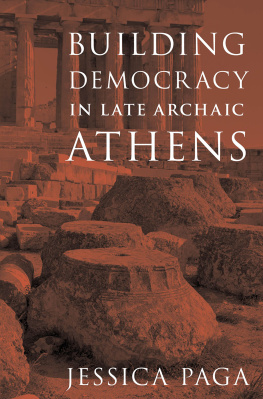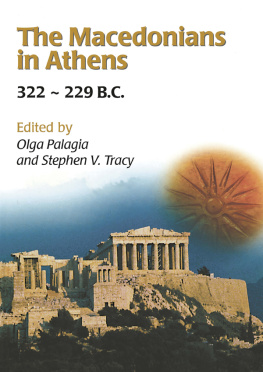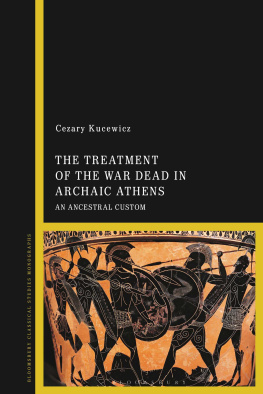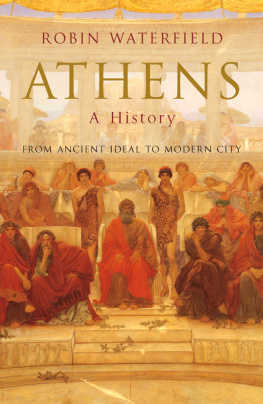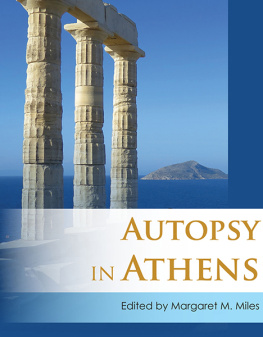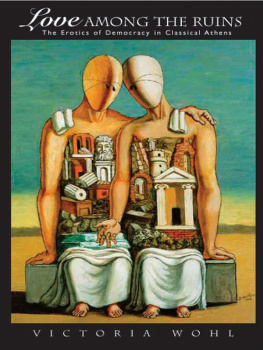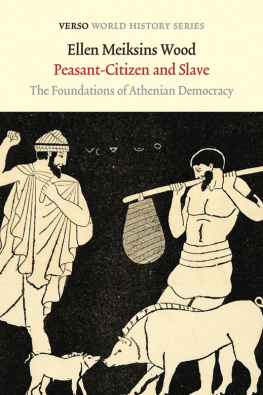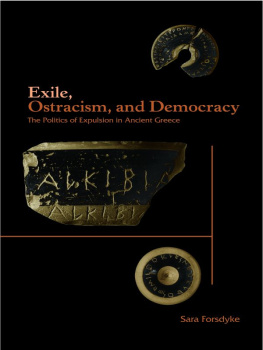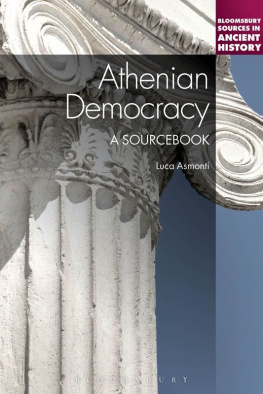Jessica Paga - Building Democracy in Late Archaic Athens
Here you can read online Jessica Paga - Building Democracy in Late Archaic Athens full text of the book (entire story) in english for free. Download pdf and epub, get meaning, cover and reviews about this ebook. year: 2020, publisher: Oxford University Press, genre: Romance novel. Description of the work, (preface) as well as reviews are available. Best literature library LitArk.com created for fans of good reading and offers a wide selection of genres:
Romance novel
Science fiction
Adventure
Detective
Science
History
Home and family
Prose
Art
Politics
Computer
Non-fiction
Religion
Business
Children
Humor
Choose a favorite category and find really read worthwhile books. Enjoy immersion in the world of imagination, feel the emotions of the characters or learn something new for yourself, make an fascinating discovery.
- Book:Building Democracy in Late Archaic Athens
- Author:
- Publisher:Oxford University Press
- Genre:
- Year:2020
- Rating:5 / 5
- Favourites:Add to favourites
- Your mark:
- 100
- 1
- 2
- 3
- 4
- 5
Building Democracy in Late Archaic Athens: summary, description and annotation
We offer to read an annotation, description, summary or preface (depends on what the author of the book "Building Democracy in Late Archaic Athens" wrote himself). If you haven't found the necessary information about the book — write in the comments, we will try to find it.
Building Democracy in Late Archaic Athens — read online for free the complete book (whole text) full work
Below is the text of the book, divided by pages. System saving the place of the last page read, allows you to conveniently read the book "Building Democracy in Late Archaic Athens" online for free, without having to search again every time where you left off. Put a bookmark, and you can go to the page where you finished reading at any time.
Font size:
Interval:
Bookmark:


Oxford University Press is a department of the University of Oxford. It furthers the Universitys objective of excellence in research, scholarship, and education by publishing worldwide. Oxford is a registered trade mark of Oxford University Press in the UK and certain other countries.
Published in the United States of America by Oxford University Press
198 Madison Avenue, New York, NY 10016, United States of America.
Oxford University Press 2021
All rights reserved. No part of this publication may be reproduced, stored in a retrieval system, or transmitted, in any form or by any means, without the prior permission in writing of Oxford University Press, or as expressly permitted by law, by license, or under terms agreed with the appropriate reproduction rights organization. Inquiries concerning reproduction outside the scope of the above should be sent to the Rights Department, Oxford University Press, at the address above. You must not circulate this work in any other form and you must impose this same condition on any acquirer.
Library of Congress Cataloging-in-Publication Data
Names: Paga, Jessica, author.
Title: Building democracy in late archaic Athens / Jessica Paga.
Description: New York, NY, United States of America : Oxford University Press, 2021. |
Includes bibliographical references and index. |
Identifiers: LCCN 2020017401 (print) | LCCN 2020017402 (ebook) |
ISBN 9780190083571 (hardback) | ISBN 9780190083595 (epub)
Subjects: LCSH: Democracy and architectureGreeceAthens. | Architecture and society
GreeceAthensHistoryTo 1500. | Athens (Greece)Politics and government. | Architecture
GreeceAthens. | Athens (Greece)Buildings, structures, etc.
Classification: LCC NA2543.S6 P27 2020 (print) | LCC NA2543.S6 (ebook) | DDC 720.1/03dc23
LC record available at https://lccn.loc.gov/2020017401
LC ebook record available at https://lccn.loc.gov/2020017402
This publication has been supported by grants from the Samuel H. Kress Foundation and the von
Bothmer Publication Fund, administered by the Archaeological Institute of America.

For my parents, for Marcus, for hope to come.
nothing is done in a vacuum, this project especially. I have been incredibly fortunate to receive support from a variety of people and institutions. The following represents only a small portion of those to whom I owe gratitude.
The ideas in this book have had a long gestation. Trips to construction sites as a child with my father and long days with Legos started a love affair with architecture that shows no signs of flagging. While an undergraduate at Smith College, a chance encounter with ancient Greek and a deepening affinity for Art History led me toward Classical Archaeology. For their guidance and support, I thank John Davis, Scott Bradbury, Justina Gregory, Caroline Houser, and Barbara Kellum.
At Princeton, I was lucky enough to have T. Leslie Shear, Jr., as my mentor. I learned a great deal from him, along with rest of the faculty of the departments of Art and Archaeology and Classics. Prior to his departure to Stanford, Josiah Ober offered me a seat in his final Princeton seminar. I am incredibly indebted to this class and the ideas we discussed. This book had its start as an unwieldy dissertation, and I thank the members of my committee (T. L. Shear, Jr., Nathan Arrington, Michael Padgett, and Michael Koortbojian) for bearing with me during the process of writing it. In addition, a Barr Ferree Subvention Grant from Princeton University helped with the cost of image permissions and color printing.
A not insignificant portion of my time in graduate school and beyond was spent at the American School of Classical Studies in Athens, an institution that I return to again and again, a home away from home. I want to especially thank my Andrew W. Mellon Professor, Margaret Miles, for her contagious enthusiasm and keen eye for detail. It always feels special when a professional (and professorial) relationship evolves into a true friendship, and one of my favorite memories remains our mutual admiration of an inverted (interior angle) corner geison block of the Stoa of Zeus Eleutherios in the Agora (we both claimed it as one of our favorite blocks). I also thank my peers from the ASCSA, especially Johanna Best, Kelcy Sagstetter, and Emily Egan, for their laughter and encouragement. The entire staff of the ASCSA enrich the school and its mission and I am privileged to belong to such an institution. In particular, my thanks go to John Camp, Sylvie Dumont, and Craig Mauzy at the Agora, and Dylan Rogers and Maria Pilali in the Athens office.
Colleagues at the College of William & Mary and Washington University in St. Louis also facilitated the completion of this project, with their unending support and encouragement. Talking with colleagues and teaching students about ancient Greece has left a strong mark on this book, and on me as a scholar. In particular, I wish to thank two of my students, who served as research assistants: Bailey M. Hall and Kathleen Lauer.
Several grants and fellowships allowed this project to move forward. From 2013 to 2015, I was an Andrew W. Mellon Post-Doctoral Fellow in Modeling Interdisciplinary Inquiry at Washington University in St. Louis and a Research Associate in the Classics department. In the Fall of 2018, I was a Fellow at the Center for Hellenic Studies in Washington, DC. William & Mary provided several summer research grants to facilitate travel. The Archaeological Institute of America also deserves my gratitude. The final push for this project was made possible by a Samuel H. Kress Grant for Research and Publication, and the inclusion of color images by a von Bothmer Publication Grant. Without these research grants and fellowships, the book would have taken far longer and been less nuanced.
The editorial and production staff at OUP also deserve a round of applause. In particular, Id like to extend my gratitude to Stefan Vranka, who stepped into the position of being my editor after the departure of Sarah Humphreville. Sarah offered unending encouragement and patience, and then Stefan helped corral this project into its final shape.
At times when it seemed impossible, that this book would never be complete, I found solace in friends. My Samothrace family, and especially the compassionate mentorship of Bonna Wescoat, provided laughter, help, and hugs. Marya Fisher sustained me through Cyprus and continues to sustain me through thick and thin. Leslie Geddes, my true soul sister, has shared in the ups and downs like few others, and so many of the initial ideas for this project were born in the stacks of Marquand after fruitful conversations.
Most of all, I would like to thank my husband John Lombardini, without whose endless support and encouragement none of this would have been possible. He has humored my love for rocks and trekked along with me all over the Mediterranean, constantly ready to listen, offer suggestions, and help me achieve my dreams. Always and forever.
Athenian history of the fifth century B.C. has, on the whole, become a battlefield where only the trained hoplite can compete. By contrast, the period from Cleisthenes down to 480 is one where the mere peltast still has an honest chance. There are... practically no facts known, and ingenuity and imagination have been limited only by what the audience has been ready to believe. The limits have traditionally been generous.
Font size:
Interval:
Bookmark:
Similar books «Building Democracy in Late Archaic Athens»
Look at similar books to Building Democracy in Late Archaic Athens. We have selected literature similar in name and meaning in the hope of providing readers with more options to find new, interesting, not yet read works.
Discussion, reviews of the book Building Democracy in Late Archaic Athens and just readers' own opinions. Leave your comments, write what you think about the work, its meaning or the main characters. Specify what exactly you liked and what you didn't like, and why you think so.

